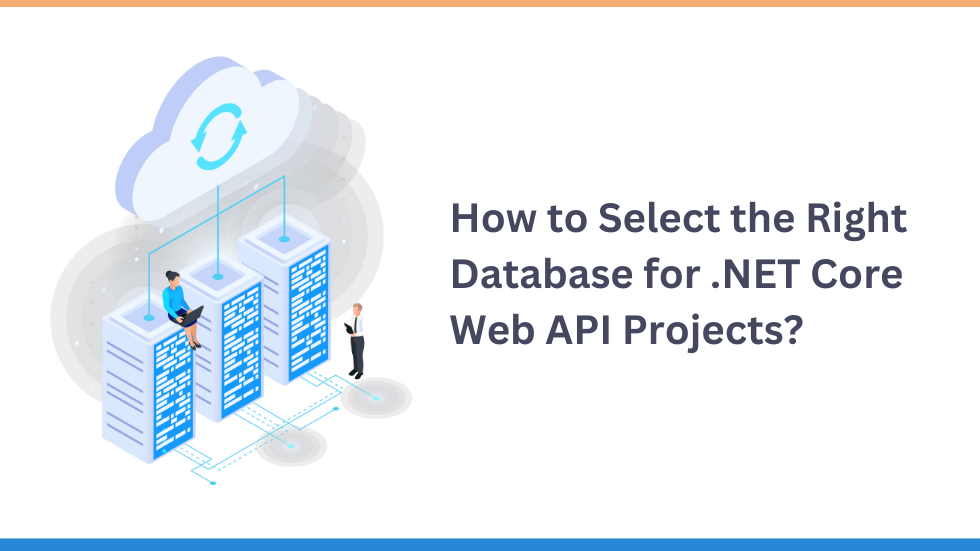In the world of modern application development, the database for .NET Core Web API plays a critical role in ensuring performance, scalability, and long-term stability.
For enterprises, startups, and seed-funded companies, selecting the right database is not just a technical step—it’s a strategic decision that impacts user experience, cost efficiency, and future growth.
This guide explores the best database options for .NET Core Web API, key factors to consider, and how to match the right technology with your project’s requirements.
Why the Database Matters in .NET Core Web API Development
Every .NET Core Web API relies on a database to power data storage, retrieval, and transactions. The choice of database affects:
- Application performance and responsiveness
- Scalability for handling growing traffic and datasets
- Data integrity and security
- Development speed and complexity
- Cost management for long-term operations
Types of Databases for .NET Core Web API
When choosing the best database for .NET Core Web API, it helps to understand the three main categories:
1. Relational Databases (RDBMS)
- Best for: Structured data, transactional integrity, and enterprise-grade applications.
- Examples:
- Microsoft SQL Server: Perfectly aligned with the .NET ecosystem, offering advanced features and security.
- PostgreSQL: Open-source, highly scalable, and ideal for enterprises seeking flexibility.
- MySQL: Cost-effective, widely supported, and suitable for mid-sized projects.
2. NoSQL Databases
- Best for: Applications needing flexibility, horizontal scalability, and high performance.
- Examples:
- MongoDB: A document-oriented database popular for rapid development and scalability.
- Cassandra: Handles massive datasets and high write throughput efficiently.
- Redis: Often used as a cache or for real-time analytics in API-driven architectures.
3. In-Memory Databases
- Best for: Real-time applications requiring ultra-low latency.
- Examples:
- Redis: Supports caching, session storage, and real-time data processing.
- Memcached: Lightweight, fast, and commonly used for caching purposes.
Key Factors in Selecting the Best Database for .NET Core Web API
Before making your decision, assess these critical factors:
- Data Model: Structured vs semi-structured or unstructured data.
- Performance: Does your application demand real-time speed?
- Scalability: Will it need to handle millions of records or concurrent users?
- Development Complexity: Familiarity with SQL or NoSQL technologies.
- Cost: Licensing fees and cloud hosting expenses.
- Security: Compliance and data protection requirements.
Advanced Considerations for Enterprises and Startups
Modern businesses often go beyond traditional setups when selecting a database for .NET Core Web API:
- Cloud Databases: Azure SQL Database, AWS RDS, and Google Cloud SQL simplify scaling and maintenance.
- Database-as-a-Service (DBaaS): Reduces management overhead with automatic updates and backups.
- Hybrid Architectures: Using relational databases for core data while leveraging NoSQL or Redis for caching and high-speed access.
SQL vs NoSQL for .NET Core Web API
A common dilemma for businesses is SQL vs NoSQL for .NET Core Web API:
- Choose SQL (e.g., SQL Server, PostgreSQL): If you need strong consistency, transactional support, and structured schema.
- Choose NoSQL (e.g., MongoDB, Cassandra): If your application requires rapid scaling, flexible schemas, and real-time analytics.
Often, combining both can deliver the best balance for enterprise applications.
Conclusion
There is no universal “best” database for .NET Core Web API—the right choice depends on your project’s requirements, scalability goals, and budget.
- Go with SQL Server or PostgreSQL if you need robust structure and enterprise-grade reliability.
- Opt for MongoDB or Cassandra when flexibility and scalability are top priorities.
- Use Redis or Memcached to enhance speed and enable real-time performance.
By evaluating your unique needs and considering long-term growth, you can select a database strategy that strengthens your .NET Core Web API and ensures sustainable success.
Additional Resources:
